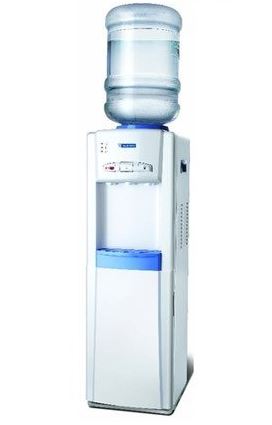Tel: 0129-4001010 Phone: +91 730 321 5033
Email: cs@absoluteveritas.com
BIS CERTIFICATION FOR Bottled water dispensers IS 17681:2022
In a world prioritizing quality and safety, securing Bureau of Indian Standards (BIS) certification for bottled water dispensers is essential for manufacturers. Adhering to IS 17681 standards guarantees consumers of dependable and secure products, while also creating opportunities for businesses to excel in a competitive market.
Bottled water dispensers not only fulfill the need for clean water but also promote environmental responsibility and customization options. They offer a convenient solution to stay hydrated throughout the day, with significant benefits for health, personal hygiene, and community welfare.
Let's delve deeper into at IS 17681:2022 for Bottled water dispensers.
INDIAN STANDARD 17681
This standard defines the performance and safety criteria for bottled water dispensers utilizing a vapor compression refrigeration system to dispense hot, cold, and room temperature water. It applies to dispensers with single-phase operation, cooling capacities up to 8 liters per hour, heating capacities up to 5 liters per hour, and rated voltages not exceeding 240 V AC at 50 Hz.
This standard applies to the following types of bottled water dispensers:
-
Bottom load water dispenser
-
Table-top water dispenser and
-
Freestanding water dispenser
The bottled water dispensers covered by this standard may offer combinations of hot, cold, and room temperature water dispensing options.
-
Cold and hot;
-
Hot and room temperature
-
Cold and room temperature
-
Water dispenser with an in-built refrigerator cabinet
This standard excludes the following:
-
Peltier-based bottled water dispenser
-
Self-contained water coolers covered in IS 1475 (Part 1)
-
Water dispensers directly connected to the water line from an overhead tank or through a direct water pipeline are not covered by this standard.
Document Required for Certification
The following documentation is necessary to obtain certification for a water bottle dispenser:
-
Main Application Form V
-
Address Proof of Manufacturing Unit
-
Details of Manufacturing Process
-
Test Report of products
TESTS
The specified tests must be conducted for supersulphated cement
-
Material Quality
-
Mechanical Strength
-
Performance under Various Conditions
-
Water Dispensing Mechanism
-
Electrical Safety
-
Energy Efficiency
-
Microbiological Safety
-
Labeling and Marking
Process of ISI / BIS Certification
There are two approaches for Indian manufacturers to become certified with the ISI Mark:
-
Regular Procedure
-
Simplified Procedure
Regular Process
Except in cases designated as "All India first," which may extend up to 180 days, the licensing process is anticipated to be completed within 120 days from the date of application receipt, provided that documentation, unit assessment, and product compliance are deemed satisfactory at various stages.
Step 1: Adapting Manufacturing Unit to Meet Relevant Indian Standards
-
Determining the applicable Indian Standard
-
Establishing in-house testing facilities in accordance with the Standard's specifications
Step 2: Application Form Submission Process
-
Generating an Internal Test Report based on the relevant Indian Standard for the product
-
Compiling all required documentation
-
Completing the Online Application Form
-
Making online payment of application fees directly to BIS
-
Submitting hard copies of the Application Form and all enclosures to the appropriate Branch Office (BO) of BIS
Simplified Procedure
This process offers significantly quicker certification compared to the standard procedure. Once a satisfactory factory inspection is conducted and initial evaluations confirm compliance with the relevant Indian Standard(s) through sample testing, the licensing procedure is expected to be completed within 30 days.
Step 1: Aligning Manufacturing Operations with Applicable Indian Standards
-
Identifying the relevant Indian Standard
-
Establishing in-house testing facilities to meet the Standard's requirements
Step 2: Sample Testing
-
Obtaining the required Material Test Certificate (MTC) for raw materials
-
Conducting product sample testing at a BIS-recognized laboratory
ISI Mark Certification Process for Foreign Manufacturers
Obtaining ISI Mark Certification for Foreign Manufacturers generally involves the following steps:
Step 1: Application
-
Gather all necessary documents.
-
Submit the documents along with the Application Fee.
-
Receive an Application Number upon submission.
-
The Application will undergo scrutiny within the stipulated timeframe.
Step 2: Addressing Queries (If Any)
-
If any documents are found missing or non-compliant, you will be notified.
-
Respond within the provided timeframe to address the queries.
BIS CERTIFICATION PROCESS
Acquiring a BIS license requires a comprehensive review of manufacturing infrastructure, quality control abilities, testing resources, and production procedures. This thorough assessment guarantees that products not only adhere to regulations but also prioritize consumer safety and reliability.
NOTE:
For comprehensive guidance on the BIS ISI Certification process, please explore:
WHY USE ABSOLUTE VERITAS?
Absolute Veritas is a prominent organisation from the private sector of India primarily dealing with the Inspection, Testing, Audits, Certification of products& consulting services to various industries in India and worldwide, ensuring compliance with regulatory standards and industry requirements. Offering a comprehensive range of services including product certification, testing, training, auditing, and compliance services, Absolute Veritas helps manufacturers and importers achieve higher production efficiency and quality standards.
Absolute Veritas (AV) will handle end to end pre-registration request, sample preparation, documentation, testing and application process for FMCS Certification
For any questions regarding the most recent update on FMCS registration licenses, please reach out to us via email at cs@absoluteveritas.com



